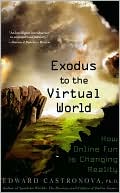In this 2007 followup to his “Synthetic Worlds” book, Castronova sent me on a journey of new ideas. Some of his ideas made sense right of the bat, while others made me stop and reflect a bit. All of it is insightful and thought-provoking. Essentially, the work lays out a vision for what is expected to happen along the evolutionary lines that virtual worlds have been following since the early days of MMOGs. The book also discusses some projections and suggestions about how we can expect our real world to be affected by the very real trend that people are devoting more time inhabiting virtual worlds and spending more of their wages there.
The book lays out a set of predictions, each of which is elaborated on throughout the book. At the core of the book’s vision, is that as virtual worlds become more attractive to inhabit and earn income from than the “real” world, more people will spend more of their time there. This is no different than people who save up or dream of moving to a real-world location that will be more beneficial to them, for whatever reason – climate, taxes, job opportunities, etc. Millions of people already “migrate” to virtual worlds for a significant period of their time each week, and some of them have jobs and earn real income there, like “builders” in Second Life.
Another major point is that much of the attraction of virtual worlds and online games is the “fun” it provides to the player. Castronova warns that real-world jobs and experiences need to compete on that basis. I think many of us can look back at our prior TV viewing habits and recognize that we are spending much less time on that form of entertainment. An unfortunate consequence may be that we are also spending less time on healthy and rewarding outdoor activities.
Castronova’s main predictions from 2007 are as follows:
1. Even larger numbers of people will spend many hours inside online games
2. The public will come to think of game design and public policy design as roughly similar activities
3. Game design techniques may find their way into real-world policy debates
4. Public policy will begin to focus more directly on human happiness, even fun, than it does now. Ultimately, games will force “fun” onto the policy agenda.
One of the more believable changes that could come about, in my opinion, is that gradually, companies will begin to provide employment progression that is not limited to how many people can obtain the highest ranks in the company. In the same way that MMO players “level up” by reaching certain amounts of experience points, each person can proceed at their own pace to become knowledgeable and capable enough to earn the points necessary to reach each successive rank or title. Just as some MMO quests are simply not practical to “solo,” teaming with others would be required to develop some of the skills necessary to proceed up to higher ranks.

Additionally, we are starting to feel the effects that Castronova predicted with all the talk and activity around the “gamification” of mobile applications and real-world experiences – even to the point where many people feel it’s overused, such as getting a badge (icon or image) when you simply arrive at a physical location or click an icon on a website without having to apply any skill or strategy.
There’s more to the book than what I’ve highlighted, such as tax policy issues for virtual world earnings, but now it’s up to you to take that trip if you’re interested.
